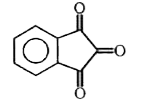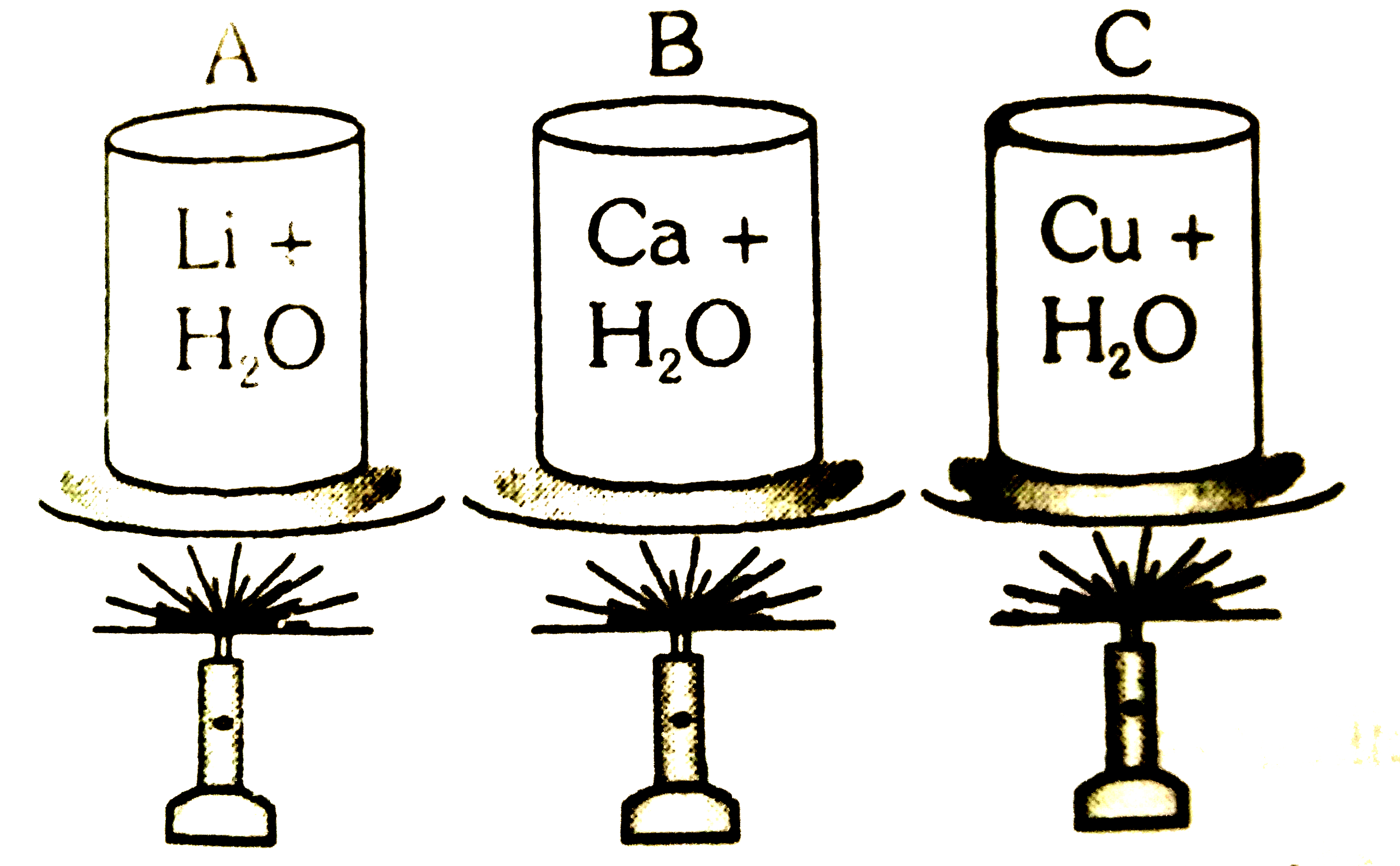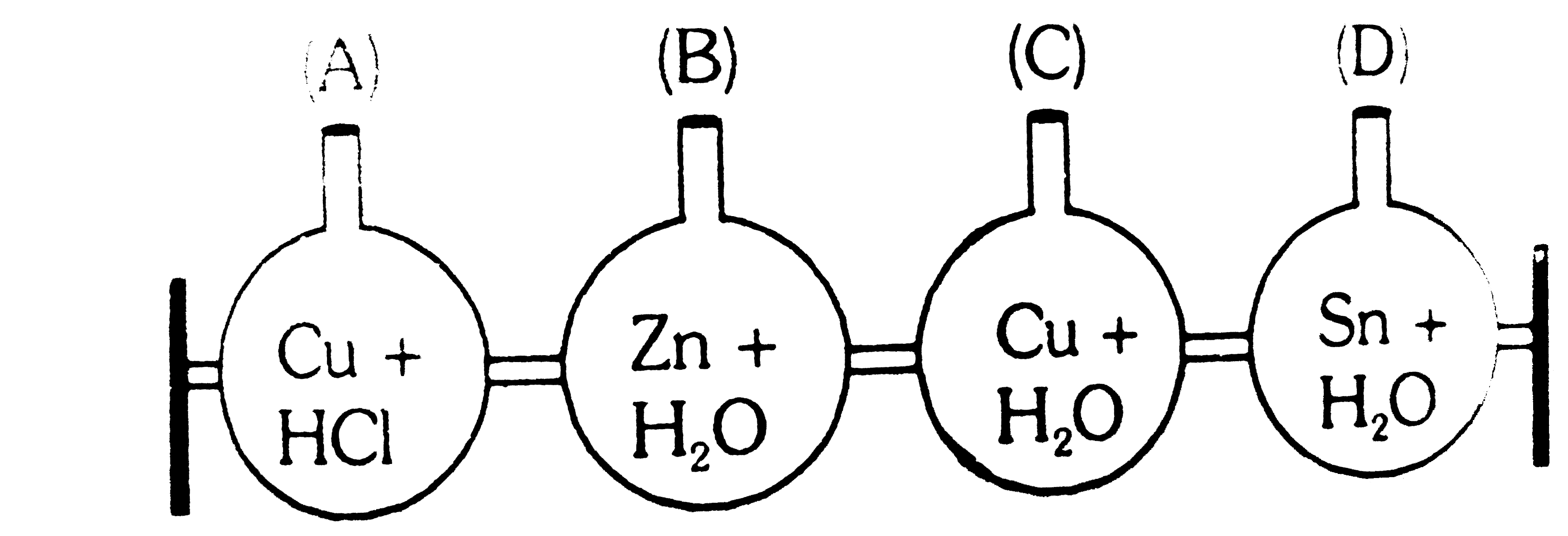Which process does not form H2 gas.
Zn+ice cold H2O
Zn+H2SO4
Na+ice cold H2O
Mg+HotH2O
The correct Answer is:A
To determine which process does not form hydrogen gas, we will analyze each option provided in the question step by step.
Step 1: Analyze the reaction of zinc with ice cold water.
- Reaction: Zinc + Ice Cold Water
- Analysis: Zinc is a less reactive metal and does not react with ice cold water. Since there is no reaction, hydrogen gas will not be produced.
- Conclusion: This process does not form hydrogen gas.
Step 2: Analyze the reaction of zinc with sulfuric acid.
- Reaction: Zinc + Sulfuric Acid (H₂SO₄)
- Analysis: Zinc is more reactive than hydrogen and can displace hydrogen from sulfuric acid. The reaction will produce zinc sulfate and hydrogen gas.
- Equation: Zn + H₂SO₄ → ZnSO₄ + H₂↑
- Conclusion: This process does form hydrogen gas.
Step 3: Analyze the reaction of sodium with ice cold water.
- Reaction: Sodium + Ice Cold Water
- Analysis: Sodium is a highly reactive alkali metal and reacts vigorously with ice cold water to produce sodium hydroxide and hydrogen gas.
- Equation: 2Na + 2H₂O → 2NaOH + H₂↑
- Conclusion: This process does form hydrogen gas.
Step 4: Analyze the reaction of magnesium with hot water.
- Reaction: Magnesium + Hot Water
- Analysis: Magnesium is less reactive than sodium but can react with hot water to produce magnesium hydroxide and hydrogen gas.
- Equation: Mg + 2H₂O (hot) → Mg(OH)₂ + H₂↑
- Conclusion: This process does form hydrogen gas.
Final Conclusion:
Based on the analysis of each option, the process that does not form hydrogen gas is the reaction of zinc with ice cold water.
Answer:
Zinc reacting with ice cold water does not form hydrogen gas.
---
- Reaction: Zinc + Ice Cold Water
- Analysis: Zinc is a less reactive metal and does not react with ice cold water. Since there is no reaction, hydrogen gas will not be produced.
- Conclusion: This process does not form hydrogen gas.
- Reaction: Zinc + Sulfuric Acid (H₂SO₄)
- Analysis: Zinc is more reactive than hydrogen and can displace hydrogen from sulfuric acid. The reaction will produce zinc sulfate and hydrogen gas.
- Equation: Zn + H₂SO₄ → ZnSO₄ + H₂↑
- Conclusion: This process does form hydrogen gas.
- Reaction: Sodium + Ice Cold Water
- Analysis: Sodium is a highly reactive alkali metal and reacts vigorously with ice cold water to produce sodium hydroxide and hydrogen gas.
- Equation: 2Na + 2H₂O → 2NaOH + H₂↑
- Conclusion: This process does form hydrogen gas.
- Reaction: Magnesium + Hot Water
- Analysis: Magnesium is less reactive than sodium but can react with hot water to produce magnesium hydroxide and hydrogen gas.
- Equation: Mg + 2H₂O (hot) → Mg(OH)₂ + H₂↑
- Conclusion: This process does form hydrogen gas.
Based on the analysis of each option, the process that does not form hydrogen gas is the reaction of zinc with ice cold water.
Zinc reacting with ice cold water does not form hydrogen gas.
Topper's Solved these Questions
Similar Questions
Knowledge Check
Which of the following does not form a stable hydrate on addition of H2O ?
A B
B C
C D
D
Which of the folowing process does not occur at the interface of phases?
ACrystallisationBHeterogeneous catalysisChomogeneous catalysisDCorrosion
Which of following reaction do not form H2?
View SolutionBy which reaction. Best yield of H2 gas forms :

Temperature of container is more than 100∘C
View SolutionBy which reaction best yield of H2 gas forms:

temperature of all flask More then 100∘C
View SolutionWhich anion does not liberate any gas with dilute as well as conc. H2SO4.
View SolutionAn ideal gas expands while the pressure is kept constant. During the process, does heat flow into the gas or out of the gas? Justify you answer.
View SolutionWhich of the following process does not increase the amount of CO2 in atmosphere?
View Solution
